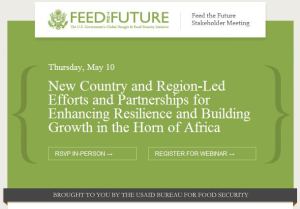In 2011, the Horn of Africa was hit by the worst drought in 60 years. The extreme weather condition affected over 13 million people, principally pastoralists and farmers, and triggered a severe food crisis in the area, especially in Somalia. How to enhance the resilience in Horn of Africa became an urgent agenda for the international development world.
 In a recent paper by Derek Headey, Alemayehu Seyoum Taffesse and Liangzhi You, IFPRI researchers explore the investments options in the Horn of Africa, aiming to improve the region’s resilience against nature disasters, ensure food security and ultimately achieve an economic transformation in the area. The paper argues that although increasing the economic diversity is an important path to tackle the challenges, it is also crucial to transform pastoralism, the traditional and primary livelihood in the region, into a more commercialized and resilient sector. It is not only because mobile livestock herds have comparative advantages of using the relative abundant land and minimizing the risks caused by the various rainfall patterns, but also considers the rising demand for livestock products in the global market. For example, Ethiopia’s livestock exports have been growing for years. There is also a large foreign market in the Middle East with lots of opportunities for the livestock produced in the Horn of Africa. The authors suggest four pillars for investing in the pastoralist agricultural sector: commercialization, technological intensification, property rights and diversification.
In a recent paper by Derek Headey, Alemayehu Seyoum Taffesse and Liangzhi You, IFPRI researchers explore the investments options in the Horn of Africa, aiming to improve the region’s resilience against nature disasters, ensure food security and ultimately achieve an economic transformation in the area. The paper argues that although increasing the economic diversity is an important path to tackle the challenges, it is also crucial to transform pastoralism, the traditional and primary livelihood in the region, into a more commercialized and resilient sector. It is not only because mobile livestock herds have comparative advantages of using the relative abundant land and minimizing the risks caused by the various rainfall patterns, but also considers the rising demand for livestock products in the global market. For example, Ethiopia’s livestock exports have been growing for years. There is also a large foreign market in the Middle East with lots of opportunities for the livestock produced in the Horn of Africa. The authors suggest four pillars for investing in the pastoralist agricultural sector: commercialization, technological intensification, property rights and diversification.
 International development partners are also taking actions. In May 10, USAID, together with the Intergovernmental Authority on Development (IGAD) and the African Union, will gather development stakeholders and civil society to discuss the new country and region-led efforts and partnerships for enhancing resilience and building growth in the Horn of Africa. Registration and more information could be found on their website.
International development partners are also taking actions. In May 10, USAID, together with the Intergovernmental Authority on Development (IGAD) and the African Union, will gather development stakeholders and civil society to discuss the new country and region-led efforts and partnerships for enhancing resilience and building growth in the Horn of Africa. Registration and more information could be found on their website.
Read more about African Union Long-Term Strategy in Horn of Africa through CAADP.

